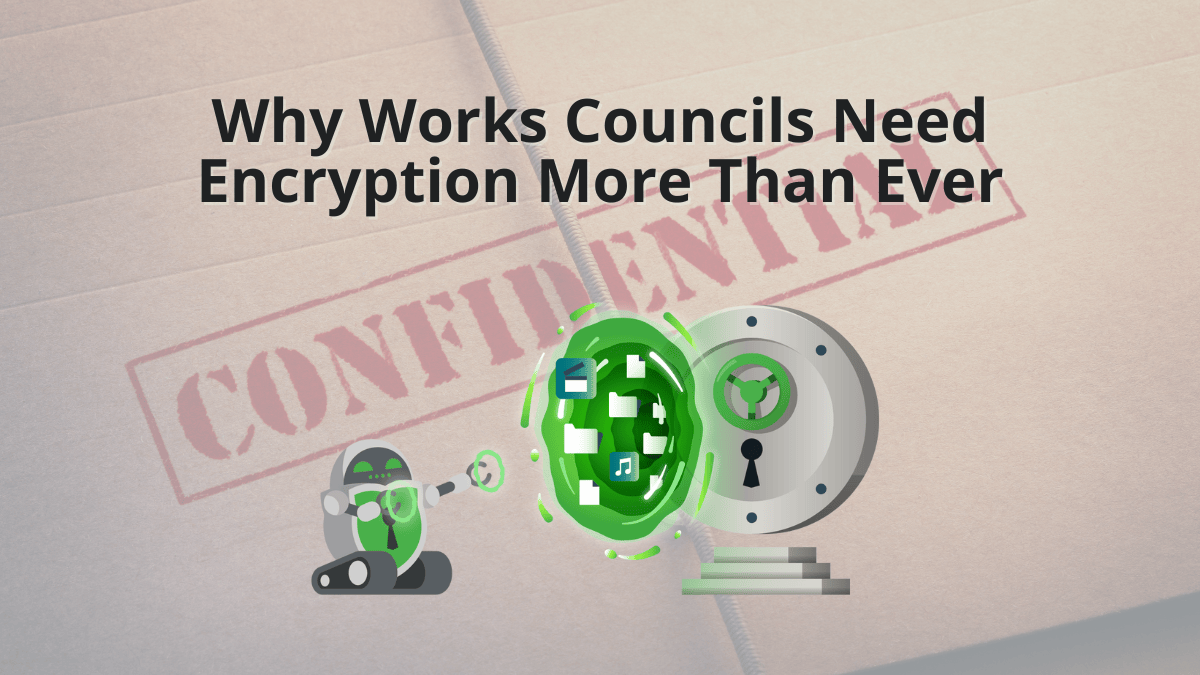Blog / Confidentiality Is a Must: Why Works Councils Need Encryption
Works councils play a central role in companies when it comes to protecting the interests of employees. In doing so, they process particularly sensitive data on a daily basis: personal complaints, election results, meeting minutes, or confidential agreements with trade unions. All of this information is not only subject to a moral obligation of confidentiality—it also falls under the strict requirements of the GDPR.
But how can a works council fulfill this responsibility in the digital age, when documents are often stored, shared, and edited collaboratively in the cloud? The answer lies in a combination of technical security, organizational processes, and the right tools.

Sensitive Data Requires Special Protective Measures
Personnel data, sick notes, conflict discussions, internal processes—works councils have deep insights into the innermost workings of the company. This information concerns not only labor law disputes or restructuring, but also very personal situations in the lives of employees.
The GDPR requires such personal data to be protected with appropriate technical and organizational measures. This explicitly includes encryption. This measure is not an optional extra, but a central component of works council work that complies with data protection regulations.
Why Encryption Is Not Always the Same
Many companies today already rely on cloud-based systems such as Microsoft 365 or Google Workspace. These solutions advertise built-in security and encryption. However, what many people don’t know is that this often involves server-side encryption, which means that although the data is encrypted, the provider or administrator has the keys. Anyone who has access to the system can also access the data. This applies in particular to internal company administrators or external service providers.
This is not sufficient for particularly sensitive information, such as that processed by works councils. End-to-end encryption is required here: only authorized persons can access the content – even cloud providers or central IT departments have no access. The key to access remains exclusively with the works council.
Digital Sovereignty With Cryptomator Hub
Cryptomator Hub provides works councils with a tool that meets precisely these requirements. The solution enables the creation of encrypted data rooms (known as vaults) that can be used on any common cloud platform – while remaining entirely under the control of the council.
Vaults can be structured according to topics, roles, or working groups – for example, for minutes, election documents, complaints, or legal advice. Access rights can be assigned granularly via a clear interface. For example, only the election committee is authorized to access election documents, while other members have access to general meeting minutes.
Another advantage: the Web of Trust principle allows the committee to integrate new devices and members on a trust basis – without any central IT management or external administration. This is how digital self-administration becomes a reality.
Integration Without IT Dependency
A common obstacle for works councils is their dependence on their employer’s IT infrastructure. What if the company itself provides the cloud platform? Or what if the works council does not operate its own technical infrastructure?
Cryptomator Hub works independently of the underlying cloud. This means that even if the company provides Dropbox, OneDrive, or Nextcloud, the works council can securely encrypt its content without the employer having access. Control over the key and access structure remains exclusively with the committee.
It can also be used on private devices, which is an important factor for smaller works councils or committees without their own office infrastructure.
Conclusion
Confidentiality is not a nice-to-have, but a legal obligation and a responsibility that must be upheld. Works councils facing digital transformation should view the protection of sensitive data as a key requirement—not only to comply with legal requirements, but also to maintain the trust of the workforce.
With end-to-end encryption and independent tools such as Cryptomator Hub, works councils can fulfill this obligation securely, easily, and independently. And in doing so, they can send an important message: for digital maturity, for data protection, and for modern co-determination on an equal footing.